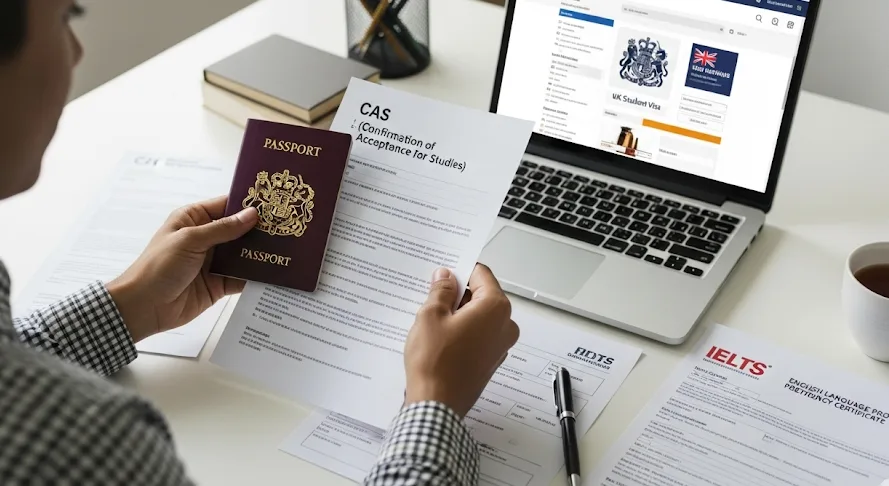
The UK Student Visa (formerly Tier 4 General Student Visa) is the definitive permission required for international students aged 16 or over to pursue higher education or long-term study in the United Kingdom. As the UK government continuously refines its immigration rules, securing this visa is a highly detailed, point-based process that requires meticulous preparation. Errors can lead to delays or outright refusal, jeopardising academic plans.
This guide provides a comprehensive, step-by-step breakdown of the Student Visa application. We will detail the core requirements, mandatory documentation, financial evidence standards, associated costs, work restrictions, and the critical importance of the Confirmation of Acceptance for Studies (CAS). Mastering this process is the crucial first step toward your successful academic career in the UK.
1. Eligibility: The 70-Point Requirement
The UK Student Visa system operates on a Points-Based System (PBS), where applicants must score a total of 70 points to be successful. These points are awarded for meeting three main criteria:
| Requirement | Points | Evidence |
| Confirmed Place (CAS) | 50 points | Must have a valid Confirmation of Acceptance for Studies (CAS) from a licensed student sponsor (university or college). |
| Financial Requirements | 10 points | Must prove you have sufficient funds for tuition and living costs. |
| English Language | 10 points | Must prove your ability to speak, read, write, and understand English. |
Confirmation of Acceptance for Studies (CAS) – The 50 Point Core
The CAS is not a physical document but a unique digital reference number provided by your university after you have accepted their unconditional offer and paid any necessary deposit. The CAS certifies:
- Your Course Details: Title, duration, and expected start date.
- Fees: Tuition fees for the first year and any amounts you have already paid.
- Sponsor Licence: The university’s licence number, confirming it is an approved institution.
Crucial Advice: The university cannot issue your CAS more than six months before your course starts. Ensure all details on your CAS are correct before proceeding with your visa application.
2. Mandatory Financial Requirements (10 Points)
Proving financial stability is the most common reason for visa refusal. You must demonstrate that you have the funds to cover:
A. Course Fees
You must have evidence of funds to cover the full first year’s tuition fee, minus any amount already paid (as confirmed on your CAS).
B. Living Costs (Maintenance Funds)
You must show that you have enough money for living expenses for up to nine months. The amount required depends on your study location:
| Location | Required Monthly Amount (GBP) | Total for 9 Months (Minimum) |
| London (Inner and Outer Boroughs) | £1,334 | £12,006 |
| Outside London | £1,023 | £9,207 |
Rules for Financial Evidence
- Holding Period: The required amount (tuition balance + maintenance) must be held in your bank account for a continuous period of at least 28 consecutive days.
- Validity: The bank statement must be dated no more than 31 days before you submit your online visa application.
- Format: Only certain financial documents are accepted: bank statements (in your name or parent/legal guardian’s name), or an official letter from a government/educational loan provider.
3. English Language Requirement (10 Points)
You must demonstrate your English language proficiency at the Common European Framework of Reference for Languages (CEFR) level B2 or above.
- University Assessment: If you are studying a degree-level course (or higher) at a Higher Education Provider (HEP), the university can assess your English level themselves (often via your school grades or a university-administered test) and confirm this on your CAS.
- SELT Test: If the university cannot assess your English, you must take a Secure English Language Test (SELT), such as IELTS for UKVI, from an approved test centre.
4. Key Application Costs
Applying for the Student Visa involves two main mandatory fees:
| Fee Component | Cost (GBP) | Description |
| Visa Application Fee | £490 (Applying outside the UK) | Standard cost for the application process. |
| Immigration Health Surcharge (IHS) | £776 per year | Mandatory payment to access the National Health Service (NHS), the UK’s public healthcare system, during your stay. |
| Priority Service (Optional) | Additional £500 – £1,000 | Fee for a faster decision (usually within 5 working days). |
5. The Application Process: Step-by-Step
Step 1: Secure Your Offer and CAS
- Apply and receive an unconditional offer from a licensed sponsor.
- Accept the offer and pay any deposit required by the university.
- Receive your CAS number.
Step 2: Prepare Documents and Finances
- Gather all mandatory documents (passport, CAS number).
- Obtain up-to-date financial evidence that meets the 28-day holding rule.
- Complete any required tests (e.g., Tuberculosis test in certain countries) and the Academic Technology Approval Scheme (ATAS) certificate if required for a sensitive technical course.
Step 3: Apply Online and Pay Fees
- Complete the application form on the GOV.UK website.
- Pay the Immigration Health Surcharge (IHS) and the Visa Application Fee.
Step 4: Biometrics Appointment
- Book and attend an appointment at a Visa Application Centre (VAC) to provide your fingerprints and digital photograph (biometrics).
- If applying from certain countries, you may be able to use the “UK Immigration: ID Check” app instead.
Step 5: Decision and Arrival
- Processing Time: Standard processing time is typically 3 weeks if applying from outside the UK.
- Post-Study Work: Upon successful completion of your course, you may be eligible to apply for the Graduate Visa, allowing you to stay and work in the UK for 2 years (3 years for PhD graduates) after graduation.
6. Work Restrictions While Studying
The Student Visa does grant the right to work, but with strict limits:
- During Term Time: You can work up to 20 hours per week (part-time).
- During Holidays: You can work full-time.
- Prohibited Work: You cannot be self-employed (freelancing), run your own business, or work as a professional sportsperson.
Breaching the work conditions is a serious violation that can lead to visa cancellation and immediate removal from the UK.
Frequently Asked Questions (FAQ)
1. When is the earliest I can apply for the visa? You can apply up to 6 months before your course start date if applying from outside the UK.
2. What if my parents are sponsoring me? You must submit their bank statements (meeting the 28-day rule) along with your birth certificate and a signed letter from them confirming they consent to your use of the funds.
3. What is the ATAS certificate? The Academic Technology Approval Scheme (ATAS) is required for certain postgraduate or research-level studies in sensitive subjects (often STEM). You must apply for this well in advance of your visa application if your course requires it.
4. What happens if I fail to meet the financial requirement? This is the most common reason for refusal. If the bank statement does not meet the 28-day holding period or the maintenance amount is incorrect, the application will be refused immediately.
5. Can I bring my family (dependants)? Students starting a course below degree level or a course lasting less than 9 months cannot bring dependants. Students taking a postgraduate course lasting 9 months or more may be eligible, subject to other conditions.


 Yoga and Meditation Courses in the UK: Become a Certified Instructor
Yoga and Meditation Courses in the UK: Become a Certified Instructor  First Aid Course: How to Save Lives in the UK
First Aid Course: How to Save Lives in the UK  Nutrition and Wellbeing Training in the UK: How to Help Others Live Healthier Lives
Nutrition and Wellbeing Training in the UK: How to Help Others Live Healthier Lives